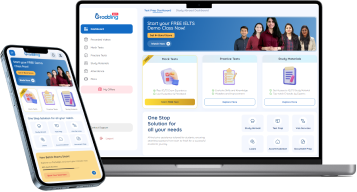Students from non-English speaking countries find the speaking section of the IELTS section tougher than others. Thus, this blog has IELTS speaking tips and tricks that experienced IELTS trainers have to give. These will help you ace the speaking sub-test on your first attempt. Read further to know more about the IELTS and tips for IELTS speaking to clear it. However, first, let us know what IELTS speaking section is about!

Table of Contents
The IELTS speaking section is the fourth section of the IELTS exam. In this, an examiner takes your interview and asks you questions for 11 to 14 minutes. It can be either in person or on a video call. This section is taken in three different parts. It means there are 3 different tasks in which you have to prove your English speaking skills. Each task is explained below:
This task lasts for 4 to 5 minutes depending on the questions and the length of your answers. You will be asked around 12 questions revolving around 3 everyday topics. These can relate to your home, family, hobbies, travel, and others. Besides, you can also get generic topics around emotions, your personal experiences, and even colors.
Also Read: Common Challenges in IELTS Speaking Section
This task lasts for 3 to 4 minutes. In this one, the examiner will give you a topic on a card on which you will have to speak. This card is called an IELTS speaking cue cards. Under this main topic, there will be some bullet points to help you prepare for the topic and get an idea of what details they expect in your answer. You must aim to speak for 2 minutes. Furthermore, the examiner will ask you follow-up questions after that.
Also Read: Latest IELTS Speaking Topics Part 1,2, and 3
Lastly, the third task takes 4 to 5 minutes to complete. The examiner chooses a generic topic to discuss with you. They ask you 5 to 6 questions based on the topic of part 2 only. In this task, you can give detailed answers and discuss these issues deeper with further questions from the examiner.
This was all about the IELTS speaking section. Now, it is time for you to learn how to ace it in one go! The section below has 10 tips for IELTS speaking which you can follow.
Here are 10 IELTS speaking tips and tricks that you can learn to clear the speaking sub-test:
The above pointers are explained below one by one:
Firstly, while preparing for IELTS speaking, you will come across several topics to practice. However, as a test taker, you must remember that memorizing the answers to these will not help you. Moreover, it will be a waste of time to engage in that. It is because the examiner assesses you based on your language skills. Thus, if you will speak a memorized answer, it will be easily detectable. Hence, this is one of the most crucial speaking tips for IELTS one can get!
It is crucial to learn good vocabulary for IELTS. However, if you are not sure of certain words and their meanings, it is better not to use them in the IELTS exam. This will prevent the wrong usage of words and the deduction of marks by the examiner. Using big and fancy words while speaking in the wrong context can affect the overall scoring of your speaking section.
As an IELTS test taker, you must be versatile with the complexity and simplicity of your phrases. Moreover, being assessed based on fluency, cohesion, and pronunciation, it is better to use a wide range of structures. Thus, you should practice speaking using different tenses.
Furthermore, you will get limited time to think about framing an answer. Moreover, there will be no extra time for you to form an answer. Thus, you might lose points upon thinking while answering. Thus, learn to use the given time wisely with regular practice through IELTS speaking mock test. Also, do not rush and utilize the entire 1 minute to frame and structure your answer.
To use the above tip, you will have to practice time management. Thus, you will have to divide the given time into parts to dedicate them to different steps. Moreover, you will have a pen and paper for rough work and noting keywords. Furthermore, you can use your time wisely and divide it into the following:
Fillers are words you speak involuntarily when you are short of words and need time to remember. For example, umm, aa. Usually, this is done by students to show fluency. However, unfortunately, this is exactly how students lose their fluency, confidence, and marks as well. Instead of these, you can pause and then speak as it is very natural even for native speakers. Fluency does not mean speaking fast, remember!
Instead of brushing up on an American or British accent, you should focus on the clear and correct pronunciation of words. It is because an accent does not add to your marks. However, clear and correct pronunciation is one of the skills assessed in this section. You can practice for this with tongue twisters available online!
Using a monotonous tone is not advisable. It can look like a flat-toned speech without expression. This is one of the most effective IELTS speaking tips by experts. Thus, it would be wise to stress over or emphasize a few words through your tone. This will make it interesting for you too. Moreover, using hand gestures can help you build confidence.
Another great advice would be to warm up on the day of the exam. This can be a short exercise of 10 minutes that can help you boost confidence and get on your heels for the test! Generally, 8 to 10 minutes is enough for a consistently practicing student to get familiar with the environment.
Lastly, you have to be regular with your practice. Consistency is the only key to helping you ace the IELTS exam in one go. Thus, you should start preparing for the IELTS exam as soon as possible. However, this can also depend on an individual’s current proficiency in English. You can start with learning a word and its meaning, and an idioms everyday.
To sum up, these IELTS speaking tips can only work if you implement them. Moreover, speaking, reading, listening, and writing in English outside of IELTS practice is crucial too. This will help you get familiar with this global language and also add to your communication skills overseas. If you are looking for expert advice, Gradding can give you experienced trainers for the same! It does not matter whether you are going there to study or work, you can approach them to get customized study plans. What matters is your personality and ideas. Thus, follow these IELTS speaking test tips to clear your IELTS exam in one go!
Usually, students face problems in the speaking section more than in any other section. It is because they have to face a stranger asking them questions on familiar subjects. Thus, experts advise students to get used to interactions with strangers in English. This will help boost confidence and make them comfortable in front of the examiner.
Learning phrasal verbs can make you remember the prepositions that go only with certain verbs. Moreover, idioms can also make the conversations more meaningful and expressive. However, using too many of them can be a problem. Also, you should only use those idioms that are clear to you in terms of meaning.
No, having a certain accent will not gain you any marks. Neither will it make you lose any of them. However, the ability to pronounce words correctly and have clarity and fluency in speech is assessed in the IELTS speaking section. Thus, you can avoid focusing on acquiring an accent to clear your IELTS speaking.
Yes, using contractions is fine while speaking. Moreover, it can also add points in pronunciation. You can use sentences like “ I am gonna travel to XYZ, before starting university”. However, it is not formal English, hence, you must abstain from using it in the IELTS writing section.
It is okay if you misunderstand the cue card or its theme. However, the best you can do in this situation is to not stop speaking. Every sentence you speak will count and will increase your score. Moreover, you can avoid this situation if you read the cue card at least twice before answering and follow the IELTS speaking tips by your IELTS coach.

We are available in :
BangaloreAhmedabadJaipurHyderabadKeralaPuneChandigarhMumbaiGurgaonChennaiKolkataTrivandrumNoidaKochiCalicutKottayamKollamThrissurIndoreUdaipurdisclaimer:logos and other registered trademarks of universities used on this platform are held by their respective owners. Gradding does not claim ownership or association on them, and their use is purely for informational and illustrative purposes.



